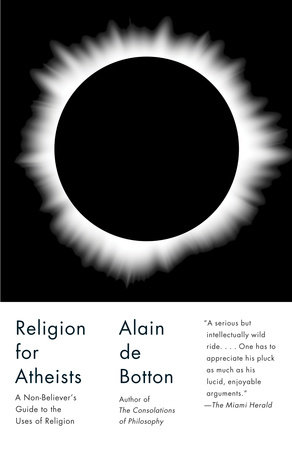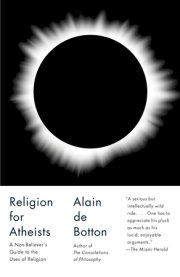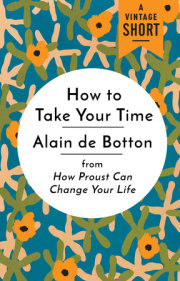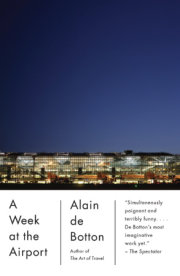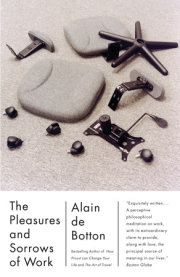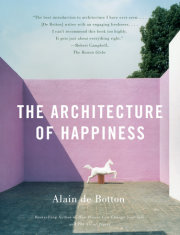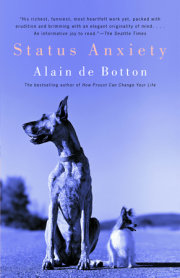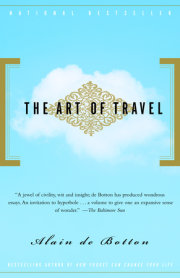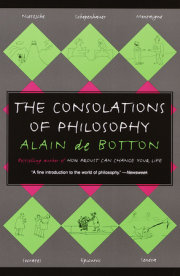Praise for Religion for Atheists
“Highly original and thought-provoking book..... de Botton is a lively, engaging writer."—Publishers Weekly starred review
“Quirky, often hilarious …Focusing on just three major faiths — Christianity, Judaism and Buddhism — [de Botton] makes a convincing case for their ability to create both a sense of community and education that addresses morality and our emotional life.” –Washington Post
“One has to appreciate his pluck as much as his lucid, enjoyable arguments, and this book, like his previous titles, is a serious but intellectually wild ride. If anyone can ‘rescue some of what is beautiful, touching and wise from all that no longer seems true,’ it’s de Botton.” –Miami Herald
“[De Botton] demonstrates his usual urbane, intelligent, and witty prose, always entertaining and worth reading…this book will advance amicable discussion among both believers and disbelievers.”
—Library Journal
“His approach, entertaining and enlightening, provides the thoughtful reader with endless enjoyment and an insight into de Botton's beliefs as well as his generous appraisal of the beliefs of others…brings insight and understanding to how religion may enhance the lives of nonbelievers.” –Shelf Awareness
“In earnest and lyrical prose, de Botton illuminates the practical functions of religion in a secular context…compelling.” –Kansas City Star
“A new book by Alain de Botton is always a treat…De Botton is literate, articulate, knowledgeable, funny and idiosyncratic.” –Forbes.com
“[De Botton] is a master of the well-heeled, chatty and above all reasonable tone…Religion for Atheists is provocative and well-intentioned.” –NPR
“A wonderfully dangerous and subversive book.” –San Francisco Chronicle
“De Botton writes at his best when he confronts our abiding human frailty…I can't help but wholeheartedly recommend de Botton's new book. It provokes thought…what continuously separates de Botton apart is his genuine attempt to alleviate loneliness and sadness in a harsh world. If only all writers wrote with such unabashedly kind intentions.” –Huffington Post
“Much of the book is common-sensical and insightful, as de Botton rescues ‘what is beautiful, touching and wise from all that seems no longer true’…the wealth of knowledge and felicity of phrasing that de Botton brings to his task make for a stimulating read…Written with de Botton's customary humor, grace and melancholy, Religion for Atheists may not always convince. But it always engages.” –Seattle Times
“Provocative and thoughtful …Particularly noteworthy are de Botton's insights on what education and the arts can borrow from the formats and paradigms of religious delivery.” –Atlantic
“Compelling…beautifully and wittily illustrated.” –Los Angeles Times
Praise for The Pleasures and Sorrows of Work
“Exquisitely written . . . A perceptive philosophical meditation on work, with its extraordinary claim to provide, along with love, the principal source of meaning in our lives.”
—The Boston Globe
“The workplace as subject matter brings out the best in de Botton’s writing . . . His wit and his powers of ironic observation are on display throughout [this] stylish and original book.”
—The Sunday Times (London)
“Like a combination of Joan Didion, David Foster Wallace and pop philosopher Thomas Moore, de Botton’s dense, pensive prose expresses a palpable preoccupation with finding better ways of living in our bewilderingly estranged age.”
—Salon
Praise for The Architecture of Happiness
“A perceptive, thoughtful, original and richly illustrated exercise in the dramatic personification of buildings of all sorts.”
—The New York Review of Books
“With originality, verve and wit, de Botton explains how we find reflections of our own values in the edifices we make . . . Altogether satisfying.”
—San Francisco Chronicle

